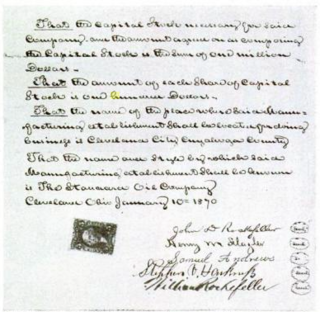
A corporation is an organization—usually a group of people or a company—authorized by the state to act as a single entity and recognized as such in law for certain purposes. Early incorporated entities were established by charter. Most jurisdictions now allow the creation of new corporations through registration. Corporations come in many different types but are usually divided by the law of the jurisdiction where they are chartered based on two aspects: by whether they can issue stock, or by whether they are formed to make a profit. Depending on the number of owners, a corporation can be classified as aggregate or sole.

The Delaware General Corporation Law is the statute of the Delaware Code that governs corporate law in the U.S. state of Delaware. Adopted in 1899, the statute has since seen Delaware become the most important jurisdiction in United States corporate law. Delaware is considered a corporate haven because of its business-friendly corporate laws compared to most other U.S. states. Over half of publicly traded corporations listed in the New York Stock Exchange and 66% of the Fortune 500, including Walmart, the world's largest company by revenue, are incorporated in the state.
Corporate personhood or juridical personality is the legal notion that a juridical person such as a corporation, separately from its associated human beings, has at least some of the legal rights and responsibilities enjoyed by natural persons. In most countries, a corporation has the same rights as a natural person to hold property, enter into contracts, and to sue or be sued.

A limited liability company (LLC) is the US-specific form of a private limited company. It is a business structure that can combine the pass-through taxation of a partnership or sole proprietorship with the limited liability of a corporation. An LLC is not a corporation under state law; it is a legal form of a company that provides limited liability to its owners in many jurisdictions. LLCs are well known for the flexibility that they provide to business owners; depending on the situation, an LLC may elect to use corporate tax rules instead of being treated as a partnership, and, under certain circumstances, LLCs may be organized as not-for-profit. In certain U.S. states, businesses that provide professional services requiring a state professional license, such as legal or medical services, may not be allowed to form an LLC but may be required to form a similar entity called a professional limited liability company (PLLC).

A joint-stock company is a business entity in which shares of the company's stock can be bought and sold by shareholders. Each shareholder owns company stock in proportion, evidenced by their shares. Shareholders are able to transfer their shares to others without any effects to the continued existence of the company.

A limited liability partnership (LLP) is a partnership in which some or all partners have limited liabilities. It therefore can exhibit elements of partnerships and corporations. In an LLP, each partner is not responsible or liable for another partner's misconduct or negligence. This distinguishes an LLP from a traditional partnership under the UK Partnership Act 1890, in which each partner has joint liability. In an LLP, some or all partners have a form of limited liability similar to that of the shareholders of a corporation. Unlike corporate shareholders, the partners have the power to manage the business directly. In contrast, corporate shareholders must elect a board of directors under the laws of various state charters. The board organizes itself and hires corporate officers who then have as "corporate" individuals the legal responsibility to manage the corporation in the corporation's best interest. An LLP also contains a different level of tax liability from that of a corporation.

Corporate law is the body of law governing the rights, relations, and conduct of persons, companies, organizations and businesses. The term refers to the legal practice of law relating to corporations, or to the theory of corporations. Corporate law often describes the law relating to matters which derive directly from the life-cycle of a corporation. It thus encompasses the formation, funding, governance, and death of a corporation.
Directors and officers liability insurance is liability insurance payable to the directors and officers of a company, or to the organization itself, as indemnification (reimbursement) for losses or advancement of defense costs in the event an insured suffers such a loss as a result of a legal action brought for alleged wrongful acts in their capacity as directors and officers. Such coverage may extend to defense costs arising from criminal and regulatory investigations or trials as well; in fact, often civil and criminal actions are brought against directors and officers simultaneously. Intentional illegal acts, however, are typically not covered under D&O policies.

In corporate governance, a company's articles of association is a document which, along with the memorandum of association form the company's constitution, and defines the responsibilities of the directors, the kind of business to be undertaken, and the means by which the shareholders exert control over the board of directors.

The limited liability limited partnership (LLLP) is a relatively new modification of the limited partnership. The LLLP form of business entity is recognized under United States commercial law. An LLLP is a limited partnership, and it consists of one or more general partners who are liable for the obligations of the entity, as well as or more protected-liability limited partners. Typically, general partners manage the LLLP, while the limited partners' interest is purely financial. Thus, the most common use of limited partnership is for purposes of investment.

A Nevada corporation is a corporation incorporated under Chapter 78 of the Nevada Revised Statutes of the U.S. state of Nevada. It is significant in United States corporate law. Nevada, like Delaware, is well known as a state that offers a corporate haven. Many major corporations are incorporated in Nevada, particularly corporations whose headquarters are located in California and other Western states.

In United States business law, a registered agent is a business or individual designated to receive service of process (SOP) when a business entity is a party in a legal action such as a lawsuit or summons. The registered agent's address may also be where the state sends the paperwork for the periodic renewal of the business entity's charter. The registered agent for a business entity may be an officer or employee of the company, or a third party, such as the organization's lawyer or a service company. Failure to properly maintain a registered agent can affect a company negatively.
A statutory corporation is a government entity created as a statutory body by statute. Their precise nature varies by jurisdiction, thus, they are statutes owned by a government or controlled by national or sub-national government to the extent provided for in the creating legislation.
The Model Business Corporation Act (MBCA) is a Model Act promulgated and periodically amended by the Corporate Laws Committee of the Business Law Section of the American Bar Association (Committee). The MBCA had been adopted by 36 states and other jurisdictions. The MBCA provides a modern body of statutory corporate law that is regularly updated by the Committee based on judicial decisions, recent legislative enactments and other legal and technological developments. It is a well-organized and clearly-written statute for business (stock) corporations that covers a number of areas, including formation, governance and director conduct and liability. The MBCA has been influential in shaping standards for United States corporate law.
Foreign corporation is a term used in the United States to describe an existing corporation that conducts business in a state or jurisdiction other than where it was originally incorporated. The term applies both to domestic corporations that are incorporated in another state and to corporations that are incorporated in a nation other than the United States. All states require that foreign corporations register with the state before conducting business in the state.

The internal affairs doctrine is a choice of law rule in corporations law. Simply stated, it provides that the "internal affairs" of a corporation will be governed by the corporate statutes and case law of the state in which the corporation is incorporated, sometimes referred to as the lex incorporationis.

United States corporate law regulates the governance, finance and power of corporations in US law. Every state and territory has its own basic corporate code, while federal law creates minimum standards for trade in company shares and governance rights, found mostly in the Securities Act of 1933 and the Securities and Exchange Act of 1934, as amended by laws like the Sarbanes–Oxley Act of 2002 and the Dodd–Frank Wall Street Reform and Consumer Protection Act. The US Constitution was interpreted by the US Supreme Court to allow corporations to incorporate in the state of their choice, regardless of where their headquarters are. Over the 20th century, most major corporations incorporated under the Delaware General Corporation Law, which offered lower corporate taxes, fewer shareholder rights against directors, and developed a specialized court and legal profession. Nevada has done the same. Twenty-four states follow the Model Business Corporation Act, while New York and California are important due to their size.
Louis K. Liggett Co. v. Lee, 288 U.S. 517 (1933), is a corporate law decision from the United States Supreme Court.

In the United States, a benefit corporation is a type of for-profit corporate entity, authorized by 35 U.S. states and the District of Columbia, that includes positive impact on society, workers, the community and the environment in addition to profit as its legally defined goals, in that the definition of "best interest of the corporation" is specified to include those impacts. Laws concerning conventional corporations typically do not specify the definition of "best interest of the corporation", which has led to the interpretation that increasing shareholder value is the only overarching or compelling interest of a corporation. Benefit corporations may not differ much from traditional C corporations. A C corporation may change to a B corporation merely by stating in its approved corporate bylaws that it is a benefit corporation; however in certain jurisdictions, the terms "public benefit corporation" or "PBC" are also required to be in the legal name of B corporations.
The Act relative to incorporations for manufacturing purposes passed by the 34th New York State Legislature on March 22, 1811, was the first law in the US giving a general authorization for formation of corporations. Whereas previously all corporations had to be formed by legislative charter, the 1811 act created a procedure for incorporation of manufacturing firms capitalized at $100,000 or less.






